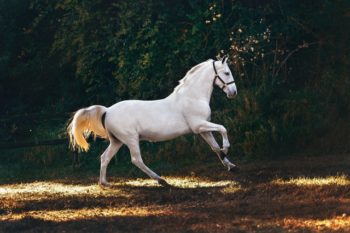Pretty in Prefix. Part II Posted by bota on Sep 2, 2021 in Grammar, language
In my last blog I left a little exercise on prefixes for you. Today, I will give you the answers and dive into what each word means and how the prefix пре or при changed its original meaning.
Превраща́ть
Враща́ть means to turn, to spin, or to rotate.
Земля́ враща́ется вокру́г со́лнца1The Earth goes around the sun
Here, the prefix пре (from пе́ре) adds that meaning of “over”. Imagine your favorite fictional character spinning around Cinderella-style. In fact, any cool metamorphosis revolves around the hero physically turning, whether it’s in a chair in front of a mirror or flying and with sparkles like Sailor Moon. However you want to spin it, the correct spelling is превраща́ть.
приоткры́ть – to open slightly.
Откры́ть – to open. Prefix при indicates that the action is not complete. Easy-peasy, right? Sometimes I wish all grammar was this straightforward.
пригна́ть
Derived from the verb гна́ть and closely related to but different from гоня́ть. This pair of verbs probably deserves a blog of their own. In short though, гна́ть and гоня́ть both can mean to urge something or someone to move faster or to drive a vehicle really fast. Пригна́ть, therefore, means to bring a car over really quick. I also stumbled across another popular use of this verb in the context of going through the process of buying a car from a foreign country, dealing with all the paperwork of getting the car back to your country and then driving it back to where you live. And yes, гна́ть and гоня́ть both appear in rude colloquial phrases like Не гони́!2Cut the cr*p! or Хоро́ш гнать!3Enough B.S.!
прекра́сный
Кра́сный, which today we know as ‘red’ used to mean ‘beautiful’ and somehow this derivative kept the original meaning of the word. The prefix пре here means “very”, so прекра́сный де́нь would be ‘a very beautiful day’. If you want to say that something is ‘too red’ you would say “сли́шком и́ли о́чень кра́сный”.
прилёт – arrival.
Лете́ть is to fly. Прилете́ть is to arrive (or literally to fly in).
преобража́ть – to transform.
You have likely seen this verb with other prefixes before: изобража́ть4to depict or to show and вообража́ть5to imagine. What word is at the very core of all three? О́браз6image. Again, I feel like this word and its derivatives deserve a full blog of their own.
престу́пник
This one is also super fun from the etymological perspective. Can you guess the root? Yes, “ступ” is from the word “ступа́ть” meaning ‘to step’. Therefore, престу́пник is someone who is stepping over the line of the law. Ру́сский язы́к тако́й краси́вый, не так ли?7Russian language is so beautiful, isn’t it?
прице́п – an attachment or a trailer.
Прицепи́ть is to attach or to hook, a close relative of the word це́пь 8a link or a chain.
приши́ть – to sew on.
I covered this one in the previous blog.
пресече́ние – interception or stopping of something
For example: пресече́ние ма́ссовых беспоря́дков9riot control
A rather formal word but the prefix пре can be substituted with пе́ре to check the spelling.
преда́тель – someone who betrays.
Once again, the prefix пре has the meaning of пе́ре and grants the verb да́ть10to give a new meaning: to give something over to another person. Переда́ть is a verb that’s commonly used in Russian, e.g. переда́й ему́ приве́т – tell him I say ‘hi’ or literally “give him my greetings”. Преда́ть, however is just used to mean “to betray” because you are literally turning someone or some sensitive information over to someone else. The suffix ‘тель’ in преда́тель makes it a noun that refers to a person, similarly to ‘учи́тель’11teacher, ‘предпринима́тель’12entrepreneur, and ‘основа́тель’13founder.
превраще́ние – transformation; see превраща́ть.
прискака́ть
Скака́ть is a verb that, depending on the context, can mean anything from jumping to skipping and from racing to riding a horse. Лошадь ска́чет – the horse is galloping, челове́к ска́чет на ло́шади – the man on a horse is riding. Colloquially it can even mean “to move from one place to another in chaotic manner” and is used to talk about things that change too much or too often.
У мое́й ба́бушки в после́днее вре́мя давле́ние ска́чет.14My grandma’s blood pressure has been all over the place recently.
Работода́тели не доверя́ют тем, кто ска́чет с ме́ста на ме́сто.15Employers don’t trust those who change workplaces too often.
With прискака́ть, as with many other verbs of motion, the prefix при makes the verb show that someone is approaching a place in a manner of either skipping, jumping, or riding a horse. In everyday speech, you can also use “прискака́ть” as a joking (sometimes even mocking) way of saying that someone arrived. Think “prince in shining armor” but ironically.
- 1The Earth goes around the sun
- 2Cut the cr*p!
- 3Enough B.S.!
- 4to depict or to show
- 5to imagine
- 6image
- 7Russian language is so beautiful, isn’t it?
- 8a link or a chain
- 9riot control
- 10to give
- 11teacher
- 12entrepreneur
- 13founder
- 14My grandma’s blood pressure has been all over the place recently.
- 15Employers don’t trust those who change workplaces too often.

Build vocabulary, practice pronunciation, and more with Transparent Language Online. Available anytime, anywhere, on any device.






